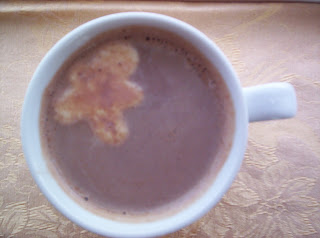 It took me a long time to figure out why my chocolate chip cookies were never quite as good as my mother's. She used the recipe off the back of the chocolate chip bag, and I so did I. But, her cookies were chewy, and good, and mine were cakey, and mediocre. Eventually, I found out, that Mother was substituting shortening for butter in the recipe. To her it was just a cost cutting measure, or an old habit, not even worth mentioning. But it made all the difference in the cookies.
It took me a long time to figure out why my chocolate chip cookies were never quite as good as my mother's. She used the recipe off the back of the chocolate chip bag, and I so did I. But, her cookies were chewy, and good, and mine were cakey, and mediocre. Eventually, I found out, that Mother was substituting shortening for butter in the recipe. To her it was just a cost cutting measure, or an old habit, not even worth mentioning. But it made all the difference in the cookies.I've never thought of Mother's secret ingredient cookies, as a lesson in chemistry, or at least I hadn't until I came across the cookie science experiment at homebaking.org.
The experiment involves mixing up four identical batches of cookies, but changing out the fat in each batch, and then measuring and recording the results.

 I had quite a few takers for this experiment today, as we mixed up 4, half batches, of chocolate chip cookie dough. We used butter in one batch, oil in another, light margarine in the third, and shortening in the last. The children observed some differences right away, as they were mixing. Butter, and shortening cream better with the sugar and egg, than oil and margarine.
I had quite a few takers for this experiment today, as we mixed up 4, half batches, of chocolate chip cookie dough. We used butter in one batch, oil in another, light margarine in the third, and shortening in the last. The children observed some differences right away, as they were mixing. Butter, and shortening cream better with the sugar and egg, than oil and margarine.
We baked them, making sure to note which row of cookies was from which batch, and observed how long it took for each batch to begin to spread.

 When they came out of the oven, we measured how far each had spread.
When they came out of the oven, we measured how far each had spread.Once they've cooled (and nap time is over), we'll do a taste and texture test, as well.
That is, if the cookies survive until after nap. I do have a fresh pot of coffee, and a cozy mystery novel to curl up with...maybe just one, or two samples wouldn't hurt.

If you're curious about how, and why, different fats effect cookie recipes differently, check out the explanation from the Home Baking Association.
Or, for more fun with children's science, click over to Adventures In Mommydom, for this week's Science Sunday link up.
It's great to be a homeschooler.



































 This Valentine's wind chime was really a craft fail of mine, recouped into a project for the girls.
This Valentine's wind chime was really a craft fail of mine, recouped into a project for the girls..JPG)







